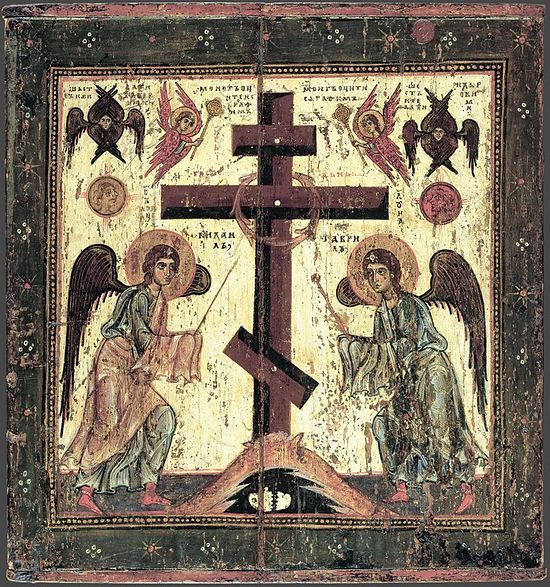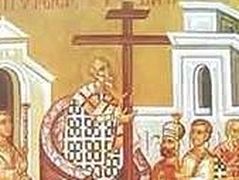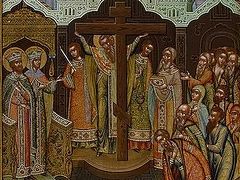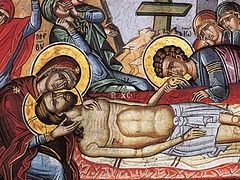
In the name of the Father, the Son and the Holy Spirit. Amen.
Brothers and sisters, today is the Procession of the Cross which we celebrate on the first of August, and also the holy Maccabean martyrs with their teacher Eleazar and their mother Solomonia. And we read today about the Cross in two readings, both because of the feast of the Procession and also because of the martyrs, because the martyrs followed the way of the Cross. Now St. Paul has two famous phrases that are in one of the epistles we read today—a very misunderstood phrase. Let’s talk about what it really means.
He speaks about the preaching of the Cross. In another place He speaks about the foolishness of the preaching of the Cross. What does this mean? It’s talked about a lot but it’s not understood. We must understand what happened on the Cross. Our Lord showed His great love for us and He destroyed death by His human death and His subsequent Resurrection. One cannot speak of the Cross without speaking of the Resurrection. We can see this clearly when we prostrate before the Cross. We sing “Before Thy Cross we bow down in worship O Master, and Thy holy Resurrection we glorify.” The Cross was the vehicle by which the Lord chose to die so that He would again live and make our flesh capable of life.
And the Cross of course was an instrument of torture. It was a way to kill someone—not only an execution, but also to humiliate them and to torment them—so it was saved only for those criminals or those people that the government wanted to make a special example of. There was shame in the Cross. But the Lord has turned the shame of the Cross into glory. This is the preaching of the Cross.
Now, some people would believe the preaching of the Cross to be that the Lord on the Cross substituted His death for ours because it was required; that because of sin we must die and because of that there was no other way out, because our sin is so huge, so infinite, that only an infinite sacrifice would suffice to bring about the regeneration of men. This is called Substitutionary Atonement and it is not at all an Orthodox doctrine. It is not at all a very old doctrine—maybe 300 years—but it is prevalent everywhere, even amongst those in the Church because they hear things from outside the Church—from radio programs or books or movies—that espouse this doctrine. It is really a terrible thing to say that the Lord was forced to die because His Father required it.
Our Lord gave His life willingly because of His love for us. The preaching of the Cross is that. We see His sacrifice. We see His love. We see His humility. We see His purpose, and we emulate it. This is the only way of life. At the end of his epistle to the Corinthians the Apostle says after saying that we preach Christ crucified—to the Jews a stumbling block, to the Greeks foolishness—but unto them that are called, both Jews and Greek, Christ the power of God and the wisdom of God.
When we see the Cross we should see power. But what kind of power? The power that comes from love, from consuming love; the power that comes from humility; the power that comes from not attacking those who attack you but turning the other cheek; not hating those who hate you but praying for them; not slandering those that slander you, but bearing all. This is the way of the Cross and it’s the only way of life.
A great disservice has been done to the Christian life by the heresies that have come into the world that make Christianity to be some sort of legal contract wherein the Cross is that legal document which ensures that we will not be judged. Christianity is to have a Father to Whom we cry “Abba;” to have His Son Who is the Body of the Church and Who calls us friend because we become like Him. We’re made in the image and likeness of God and we must, over the course of our lives, attempt to make this image shine bright. The way of the Cross will make it shine bright.
The reason why we have two readings for the Cross, as I told you in the beginning, is because of the two feasts. Generally this long reading that tells about our Lord’s actual Crucifixion and all the things that happened: Pilate writing “Jesus Christ, King of the Jews” in the three languages, and all the rest, is read for feasts of the Cross. But then another reading which is even more profound and really more applicable to us because it has commandments in it is read, which is the one about taking up the cross. The preaching of the Cross is what the Lord did for us. And the reason He did the things that He did for us is His love for us—His consuming love for us. Even though many of us have returned His love with hatred, His love with indifference, His love with hypocrisy, yet He loves all equally. This is all the way of the Cross, and the Lord commands us to take up this way.
In fact, He makes this command in startling terms that we should listen to, because Christianity is not anything legal, but it is about a relationship with Jesus Christ, with God the Father, and with the Holy Spirit, through the Church. He says, And he that taketh not His cross and followeth after Me is not worthy of Me. Before then He says something which is part of the way of the Cross and He says it in even more startling terms. He says Whosoever shall confess Me before men, him will I confess also before My Father which is in heaven. But whosoever shall deny Me before men, him will I also deny before My Father which is in heaven.
This is describing the way of the Cross which we must follow in these two commandments, both in a positive and in a negative fashion. The way of the Cross is to emulate our Lord Jesus’ Christ’s life. It’s nothing about legal contracts. It is about following our Lord, following His example. This is what Christianity is. And the reason why is because He lived the perfect human life, so that we could reach perfection. There is only one way to reach perfection, and that is by emulating Jesus Christ.
Now there is a multiplicity of life paths. One of us becomes a doctor, one of us a lawyer, one of us a priest, one of us a soldier, one of us a monk. There are multiple ways in which we follow Christ, but fundamentally all these ways must be doing the same thing—they must be obeying the preaching of the Cross. The majority of our Lord’s preaching was how He lived, not what He said. Most of what He said has not been recorded. But everything He wanted to teach us is recorded in the mind of the Church, by His example which His disciples learned and passed onto us.
And so the preaching of the Cross is to follow the example of the Lord and know that the way of the Cross is the way of power—power over sin, power over death, power over all that stuff in you that you can’t get rid of yet. You want to get rid of it? I sure do. Christianity promises that we can. All that darkness, all that icky stuff in there, the thoughts that you have that you wish you didn’t have, the things you do that you wish you didn’t do, the things you don’t do that you wish you could start doing—the Cross offers the way to accomplish these things, because the only way of life is the way to follow Jesus Christ. There is no other way. So let us follow the preaching of the Cross. It’s foolishness to most of the world. It’s foolishness to a lot of people that call themselves Christians. Let’s not listen to that. Let’s just follow the way of life. Look at our Lord’s life and follow it. This is the Christian life.
Now there’s one caveat I will say to you—how are you going to know the Lord’s life? The Lord in another place says My sheep follow Me because they know My voice, but they won’t follow a stranger because they don’t know the voice of a stranger. There are many strangers out there saying lots of things about Jesus Christ. How are you to know which are true? Well there are two things that you must do. You must struggle to follow the way of Christianity. It’s about morality. It’s about sacrifice. And also you must strive to know the Lord. How will you know Him except to read about Him with expectation in the Gospel, the Epistles and all of the Bible, and to pray before Him daily, many times each day, to come to the services and to confess and to commune, to receive His Body and Blood for eternal life? If you don’t do these things with effort you can’t know Christ, because to know Christ is to be ever-changing, ever getting better, more humble, more kind, more wise. And the way of the Cross is the only thing that will bring you to, as the apostle says, the power of God and the Wisdom of God.
May God grant us to follow this preaching of the Cross and to understand what it really is. There is not one shred of legalism in the way of the Cross. There is no contract in the way of the Cross. Do we have a contact with our father and mother? Is there anything written down? No, we love them and they love us, because it is the way things should be. So it is with the way of the Cross. The Lord loves us above everything infinitely, and so we should strive to Love Him infinitely, and as we do so by following His way of life we will experience the power of God and the Wisdom of God.
May God bless you and help you in all things.
This sermon is available in audio format at Orthodox.net.
Transcribed by OrthoChristian.com




